⚡ZurzAI.com⚡
Companies Similar to Machina Labs, Inc
DataRobot

DataRobot offers AI applications and platforms that enhance business impact and reduce risk, helping companies innovate and optimize operations with proven success stories.
DataRobot Summary
-
Key Focus Area: DataRobot specializes in delivering AI applications and platforms tailored for enterprise environments. Its focus is on enabling businesses across various industries such as energy, financial services, healthcare, manufacturing, and the public sector to develop, deliver, and govern generative and predictive AI at scale. It aims to integrate AI into core business processes, enhancing efficiency and innovation.
-
Unique Value Proposition and Strategic Advantage: DataRobot's unique value proposition lies in its comprehensive integrated solutions within the AI ecosystem:
- Integrated AI Suite: Combines generative and predictive AI frameworks with a focus on AI governance and observability.
- Enterprise-Grade Features: Its platform offers tools for building custom AI solutions that integrate smoothly with existing business processes.
- Automation and Efficiency: Clearly emphasizes a reduction in time-to-value for AI deployment by providing pre-built tools to automate AI application delivery.
-
How They Deliver on Their Value Proposition: DataRobot delivers its value proposition through a series of strategic implementations:
- Modular Yet Unified Platform: The AI platform includes a suite of applications and tools like Enterprise AI Suite, AI Apps, and AI Foundation for integrating and managing AI efficiently.
- Comprehensive Governance Framework: Ensures compliance and risk management by automating documentation and providing built-in guardrails for models, supporting various AI regulations.
- Customer Focused Solutions: The platform is industry-agnostic and supports adaptability across energy, healthcare, financial services, etc., with custom deployments tailored to client needs.
- Edge Deployment and Real-Time Monitoring: DataRobot allows for deploying AI models on the edge, delivering real-time anomaly detection and operational monitoring.
- Support Services: Offers services including quick-start programs and AI development workshops to facilitate the adoption and integration of AI capabilities within business frameworks.
In summary, DataRobot focuses on empowering businesses with scalable and secure AI solutions. Its strategic advantage is its integrated platform that simplifies AI application development and governance, allowing organizations to harness AI’s potential while managing risks and compliance efficiently. Using a mix of generative and predictive AI, it addresses diverse business needs, offering tools to optimize processes from operational efficiencies to enhancing customer experiences.
Silo AI

AMD has acquired Silo AI to enhance its AI capabilities and innovate solutions for various industries, fostering growth and operational efficiencies.
Silo AI: Company Summary
Key Focus Area: Silo AI concentrates on developing advanced artificial intelligence solutions tailored to various industry-specific applications. This company positions itself as Europe's largest private AI lab, working on implementing AI-driven tools across sectors such as automotive, maritime, logistics, energy, construction, and infrastructure. Their primary objective is to integrate AI to create smarter products and optimize manufacturers' operations through intelligent technologies like machine learning, computer vision, and natural language processing.
Unique Value Proposition and Strategic Advantage:
-
Customizable AI Solutions: Silo AI offers customizable AI solutions, allowing enterprises to implement cutting-edge technology tailored specifically to their unique operational needs. Their solutions include machine learning operations (MLOps), predictive maintenance, and sensor fusion, ensuring efficient, scalable, and sustainable business practices.
-
Extensive AI Expertise: With over 300 experts and 125 PhD-level AI specialists, Silo AI emphasizes its vast pool of in-house knowledge capable of tackling complex AI challenges. This extensive expertise provides a solid foundation for developing reliable, state-of-the-art AI models and solutions.
-
SiloGen Platform: Silo AI has developed the SiloGen platform, an enterprise AI solution supporting diverse open-source models, including those for Nordic languages. This platform facilitates rapid deployment while ensuring scalability and comprehensive customization based on specific user data.
Delivering on Their Value Proposition:
-
Industry Collaborations: Silo AI often partners with leading industry participants to integrate AI capabilities directly into their business operations. These partnerships underscore their strategy to build data-driven, intelligent systems across diverse sectors, from autonomously driven vehicles to digital optimization in infrastructure management.
-
Production-Grade AI Implementations: Silo AI utilizes its considerable experience in numerous success stories—over 200 production-grade AI implementations demonstrate its capacity to operationalize AI efficiently. Clients benefit from streamlined AI adoption, aligning closely with their strategic business objectives.
-
End-to-End Services: Silo AI provides comprehensive services from AI enablement, which entails training and technological review, to AI deployment, where they integrate AI systems into client ecosystems effortlessly. This full-stack approach ensures that clients receive an adaptable, scalable, and robust AI operational framework.
-
Continued Innovation: Silo AI engages heavily in research and development aimed at aligning AI capabilities with enterprise needs, continuously advancing through internal projects and client collaborations. They are committed to integrating pioneering AI advancements with practical industrial applications to maintain relevance and competitive advantage.
Overall, Silo AI is focused on establishing itself as a vital AI partner for businesses by offering technical expertise, operational support, and strategic AI adoption tailored to improving businesses' competitive edge.
AMP Robotics

Develops AI-guided robots for sorting recyclables.
Company's Key Focus Area: AMP Robotics focuses on modernizing and improving efficiency in the waste and recycling industry through automation and artificial intelligence. Their primary aim is to transform waste management operations by implementing intelligent robotic systems and technologies that facilitate material recovery, minimize landfill contributions, and optimize sorting efficiency across various waste streams.
Unique Value Proposition and Strategic Advantage:
- AI-Powered Automation: AMP’s unique value proposition lies in its AI-driven approach to sortation. This technology offers real-time material characterization, significantly enhancing the identification and recovery of valuable materials without human intervention.
- Zero Manual Sortation: AMP ONE™ stands out as the first zero-manual-sortation Material Recovery Facility (MRF), eliminating manual labor in sorting processes and addressing labor shortages while ensuring operational consistency and cost reductions.
- High Recovery Rates and Scalability: Their solutions are designed to achieve a 90%+ recovery rate of target materials from mixed waste streams, enhancing resource recovery and delivering a strong return on investment through scalable technology, adaptable to different facility sizes and requirements.
Delivery on Value Proposition:
-
Smart Sortation Technologies: AMP delivers on its promises via a suite of advanced technologies that include:
- Vision System: This real-time and continuous material characterization tool improves decision-making and boosts the efficiency of material recovery.
- Jet and MicroJet Systems: These high-volume air-jet technologies aid in quick and accurate material sortation in both main and quality control streams, promoting flexibility in waste processing.
- Delta Robotic System: A reliable robotic arm is integrated into operations to enhance sortation speed and precision.
- Vacuum Sortation (Vac): Specifically designed for the removal of thin films, this tech optimizes fiber line quality and reduces equipment maintenance needs.
-
Commissioning and Deployment: Their sorting facilities can be commissioned and made operational in under nine months, offering companies a quick path to enhanced operations with minimal setup time.
-
Data Analytics with AMP Insight™: This platform provides real-time operational data that enables facilities to precisely understand and optimize their waste streams, emphasizing transparency in material compositions and the purity of bales produced.
-
Modular and Scalable Solutions: AMP's technology is designed to be modular and scalable, allowing facilities to expand their processing capacities as needed, making them suitable for both small-scale and large-scale operations.
-
Commercial Models: AMP offers flexible commercial arrangements such as a pay-per-ton model, reducing upfront costs for facility operators while ensuring technological accessibility and capital efficiency.
Summary: AMP Robotics leverages AI and automation to enhance the recycling industry's economic viability and operational efficiency. By offering technologies that support zero-manual-sortation, real-time material analysis, and scalable processing solutions, AMP positions itself as a transformative force in waste management. Their strategic use of AI and innovative business models enables improved resource recovery, reduced landfill dependency, and profitable waste processing solutions.
AI21 Labs

AI21 Labs is an Israeli startup specializing in Natural Language Processing (NLP). It aims to change how people read and write using AI technology. The company has developed AI-powered language services and applications, including tools like Wordtune for text simplification and Jurassic-X for advanced NLP.
About | About | About | About | About | About | About | About | About | About | About | About | About | About | About | About | About | News | About
AI21 Labs focuses on developing generative AI solutions for enterprise applications. The company offers a suite of tools and models under various deployment options, ensuring flexibility and enhanced performance for enterprise needs.
Product Offerings:
- AI21 Studio: Provides products like Foundation Models and Task-Specific Models, designed to accommodate specific business scenarios.
- Jamba Models: Highlights the Jamba 1.5 model family, including "Mini" and "Large" versions, optimized for speed and efficiency. Jamba represents a long-context model using a unique hybrid Mamba-Transformer architecture, offering improvements in context window length and processing efficiency. These models are particularly vital for long document processing and complex task handling.
- Task-Specific Models: These models support various applications, including Contextual Answers and Embeddings, tailored for specific use cases like reading and writing.
Deployment Options:
AI21 Labs provides several deployment options to cater to diverse needs:
- AI21-Managed and Self-Managed Deployments: Allow enterprises to manage AI systems in their infrastructure or through AI21-managed services, ensuring data privacy and compliance.
- Cloud and Technology Partnerships: AI21 has collaborations with major cloud providers like Amazon, Google, and Microsoft, facilitating easy integration and scaling across different environments.
- On-premise and VPC Deployments: For organizations needing complete data control, AI21 offers these secure deployment strategies.
Conversational AI and RAG:
The company emphasizes its Conversational RAG (Retrieval-Augmented Generation) feature, combining LLM capabilities with organizational data retrieval to produce contextually accurate results. This approach is meant to improve the interaction quality in enterprise applications, such as internal tools and customer support.
Security and Integration:
AI21 Labs emphasizes comprehensive security measures through its Trust Center, ensuring compliance with regulatory standards. The company promotes the ease of integrating its AI solutions via robust APIs and partnerships, making it accessible for technology stacks.
Pricing Model:
Pricing is usage-based, with plans ranging from free trials to custom enterprise plans offering advanced API access, priority support, and expert consultation services.
Research and Development:
The company's research efforts focus on advancing AI capabilities, which are aligned with its product offerings. Research topics include the evaluation of language models, RAG systems, and AI best practices.
Company Profile:
Founded in 2017 by AI pioneers like Professor Amnon Shashua and others, AI21 Labs aims to bridge the gap between cutting-edge research and real-world applications. The company is dedicated to developing practical and scalable AI systems tailored to solve enterprise challenges.
Strategic Partnerships:
AI21 Labs collaborates with various partners, leveraging collective expertise to enhance AI solutions and drive adoption across industries.
Commitment to Privacy:
Privacy policies detail the collection and handling of personal information, underscoring compliance with global standards and ensuring user data protection.
Overall, AI21 Labs is committed to advancing AI technology in enterprise settings, emphasizing practical application, security, and innovation. The company actively develops models and systems that cater to the evolving needs of businesses, alongside maintaining strong partnerships and robust research initiatives.
MicroAI
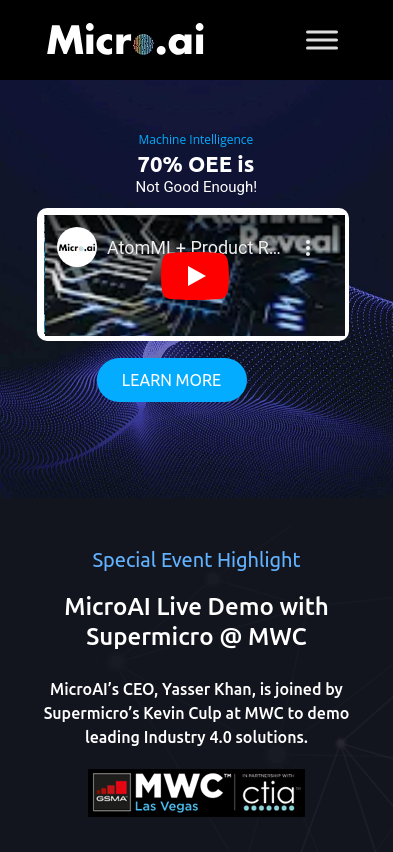
MicroAI provides AI-focused solutions for various industries, offering products like Machine Intelligence, Smart Connectivity, Security and Monitoring, Digital Factory, Launchpad, AIStudio, and Gen AI Knowledge Management primarily focusing on AI capabilities, telecom solutions, cybersecurity, manufacturing optimization, and knowledge management systems.
About | About | About | About | About | About | About | About | About | About | About | About | About
MicroAI focuses on providing advanced intelligence solutions for various industries by enhancing machine and device performance through Embedded/Edge AI and Machine Learning technologies. The company targets sectors like manufacturing, telecom, automotive, finance, and infrastructure, offering solutions that extend from machine intelligence to various facets of IT and OT asset optimization.
Key Focus Area: MicroAI's key focus is on optimizing the performance, reliability, and security of machines and devices across industries. By embedding AI and machine learning algorithms at the endpoint, MicroAI aims to make machines more transparent, providing real-time insights into their operations.
Unique Value Proposition and Strategic Advantage: MicroAI's value proposition lies in its edge and embedded AI solutions, which deliver:
- Enhanced machine transparency and performance insights.
- Predictive intelligence that minimizes downtime and maximizes output.
- A reduction in operational and maintenance costs through predictive maintenance.
Strategic advantages include:
- Providing a unified AI-enabled platform that integrates seamlessly with existing machine assets.
- Offering edge AI capabilities that reduce cloud dependency and improve data processing efficiency and security.
- Advancing zero-trust cybersecurity frameworks that protect against sophisticated cyber threats directly at the endpoint level.
Delivery on Value Proposition: MicroAI delivers its value proposition through several key methods:
-
Machine Intelligence Platform: This platform enables deeper insights into machine performance through advanced embedded AI technologies. It includes features like endpoint-based performance monitoring, predictive analytics, and intelligent workflows for operational automation.
-
Smart Connectivity: The Telecom-focused solutions provide orchestration capabilities that optimize network quality of service, create new revenue streams, and increase system sustainability. Machine learning is used to enhance device lifecycle management and accelerate market entry.
-
Security and Monitoring: Applying AI for cybersecurity, MicroAI offers rapid threat detection and mitigation strategies that drive a zero-trust security model, ensuring robust protection against cyber-attacks.
-
Digital Factory and AIStudio: These integrated solutions cater to manufacturing needs by revolutionizing factory performance, enabling predictive maintenance, and improving overall equipment effectiveness (OEE), all through AI visualization and tuning.
-
Gen AI Knowledge Management: This system utilizes generative AI to efficiently manage and analyze organizational knowledge, transforming data into actionable insights.
By consolidating these technologies into a coherent AI-enabled ecosystem, MicroAI claims to deliver reduced operational complexity and costs, improved performance metrics, and innovative solutions tailored to specific industry needs.
Machina Labs, Inc
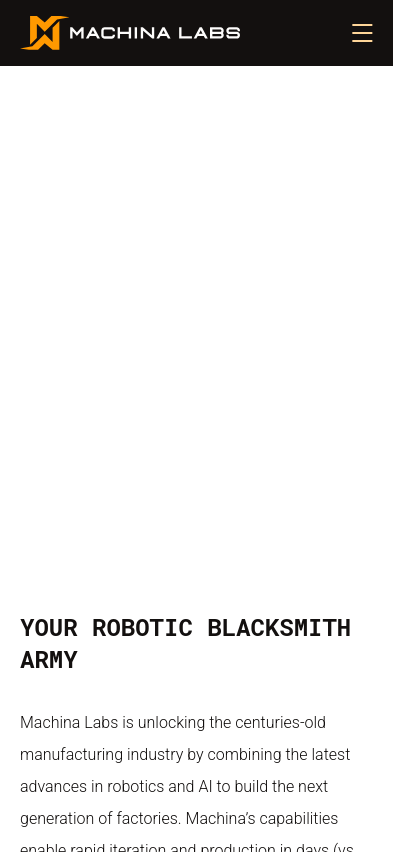
Machina Labs specializes in robotics and AI, creating smart factories for automated component manufacturing across industries like aerospace, automotive, and consumer products.
Machina Labs is focused on transforming the manufacturing sector through the integration of artificial intelligence (AI) and robotics. Their main offering, dubbed the Robotic Craftsman, is a manufacturing platform that allows for agile production employing 7-axis robots, autonomous sheet loading, and advanced AI process models. This platform offers several operations including Roboforming™, Scanning, Trimming and Drilling, and Finishing, with plans to integrate more capabilities in the future.
Key Operations and Specifications:
- Roboforming™: Leverages robotics and AI to shape metals quickly and with precision. It’s capable of handling parts up to 12 feet long and forming metal up to ¼ inch thick.
- Scanning: Utilizes a robot-mounted laser for 3D mapping to ensure manufacturing accuracy.
- Trimming and Drilling: Autonomous manipulation of cutting tools guided by precise data acquisition from scanning.
- Finishing: Options for both manual and automated finishing to achieve desired surface qualities.
Industries and Applications: Machina Labs supports several sectors, including:
- Aerospace and Defense: Rapid manufacturing that helps stakeholders like NASA and the U.S. Government.
- Automotive, Industrial, and Consumer Goods: Involves ranging from the creation of precision aero surfaces to the customization of consumer appliances.
- Composites: The Roboforming technology significantly reduces time and materials in tooling and manufacture.
Engagement and Business Models: Machina Labs offers flexible business models designed to enhance collaboration:
- Dev Suite: For initial prototype testing and concept validations.
- On Prem: Allows systems to be deployed at clients’ facilities maximizing security and speed.
- Elastic Factory: A scalable, software-defined production facility that adjusts to varying production needs without physical tooling changes.
Team and Career Opportunities: The company is backed by a team comprising experts from various fields like robotics, software engineering, and materials science. Machina Labs emphasizes a culture of diversity, inclusion, and iterative innovation.
Anvil Program: Machina Labs has ventured into automotive design with Anvil, that enables custom design and manufacturing of vehicles using the company's Roboforming platform. Initial models are based on the Ford F-150, with further extensions envisaged.
Recent Developments and Achievements:
- Machina Labs raised $32 million in their Series B funding, co-led by NVentures and Innovation Endeavors, to cater to increasing demand and R&D efforts.
- The introduction of the Deployable System, a portable version of their technology, makes it possible for manufacturers to utilize Roboforming in varied settings.
- Contracts with the U.S. Air Force and appearances on platforms like Bloomberg underline Machina’s influence in both defense and the consumer sectors.
Privacy and User Engagement: Machina Labs values customer privacy, offering clear outlines for data collection and use. Users can interact with the company through various channels and platforms, signifying a commitment to transparency and responsiveness to user needs.
In conclusion, Machina Labs is actively reshaping the landscape of manufacturing by providing systems that combine the precision of robotics with the adaptive potential of AI. This approach offers unprecedented speed and adaptability, catering to a diverse range of industries and applications.
Locus

Locus is an intelligent decision-making and automation platform for logistics. It uses AI to help businesses map out their logistics.
Locus Robotics is a company focused on optimizing warehouse operations using robotics and artificial intelligence. It offers a variety of solutions aimed at enhancing productivity, efficiency, and safety within warehouse environments across several industries.
Key Solutions:
-
Warehouse Picking: Locus's autonomous mobile robots (AMRs), known as LocusBots, assist workers by guiding them to reduce non-value-added tasks like unnecessary walking. This direction optimizes picking rates and significantly increases units picked per hour (UPH).
-
Putaway: The company's platform facilitates efficient returns and restocking, using AI to interleave tasks within workflows. This strategy is aimed at minimizing aisle congestion, enhancing worker productivity, and allowing cross-training for multiple roles.
-
Transport: Flexible robotic transport systems replace traditional fixed conveyors, reducing unproductive walking and freeing workers for more valuable tasks. LocusBots can operate seamlessly across multiple levels and adapt quickly to changing warehouse demands.
-
Mezzanine Management: The system's intelligent features direct fulfillment tasks across multi-level warehouse setups to maximize throughput.
Industry Focus:
- Third Party Logistics (3PL): Locus helps 3PLs meet high-volume fulfillment demands by integrating with warehouse management systems without necessitating major changes to infrastructure.
- Retail & eCommerce: The retailer-dedicated solutions help manage the accelerated demands from eCommerce trends through automation.
- Healthcare: In healthcare, Locus aims to ensure accuracy and timely delivery of medical supplies using their robot-assisted fulfillment system.
- Industrial: The solution targets efficiency in B2B operations like automotive and manufacturing, improving order fulfillment and adaptability to future demand fluctuations.
Platform and Services:
-
LocusOne: This is a data science-driven warehouse automation platform enabling seamless deployment and management of AMR fleets for enterprise-level operations. It integrates workflow optimization with AI and business intelligence tools to enhance performance.
-
Robots-as-a-Service (RaaS): This flexible model allows customers to scale their robotic solutions according to demand, providing cost-effective access to AMRs without substantial upfront investments.
Resources and Training:
-
The company provides a range of educational resources including webinars, podcasts, whitepapers, and case studies detailing the impact and deployment strategies of their robotics solutions.
-
Locus University offers ongoing learning and development resources to help employees grow professionally and adjust to advancing technologies.
Corporate Information:
-
Founded by individuals with significant backgrounds in robotics and warehouse operations, Locus Robotics emphasizes heritage and deep experience in warehouse automation.
-
With a focus on innovation, the company aims to drive operational excellence through robotics in supply chain management.
Events and Thought Leadership:
- Regular webinars discuss advanced strategies like continuous warehouse optimization and robustness in logistics networks, showcasing their tools like LocusHub for business intelligence enhancement.
Customer Engagement:
- Demonstrating customer success through case studies, Locus highlights significant improvements in supply chain operations for clients such as DHL, boosting productivity and improving labor efficiencies.
Overall, Locus Robotics focuses on leveraging technology to transform warehouse environments, addressing modern logistical challenges with adaptable and scalable robotic solutions across various sectors.
Vannevar Labs

Develops products for the security industry using AI-based solutions for counter-terrorism missions and natural language processing.
Vannevar Labs focuses on developing defense technology to address current national security challenges through innovative technological solutions influenced by artificial intelligence (AI) and machine learning (ML). The company's efforts are structured around several key operational areas, product developments, principles, and core values that guide their mission to enhance national security.
Key Operational Areas:
-
Digital Intelligence: Emphasizes developing methods that ensure access to mission-relevant data, even when conventional Intelligence, Surveillance, and Reconnaissance (ISR) assets are inaccessible.
-
Maritime Sensing: Involves the integration of open-source maritime data and specialized sensors to heighten maritime domain awareness.
-
Countering Malign Influence: The creation of bespoke tools designed to mitigate the coercion and subversion attempts by malicious actors globally.
-
Analytical Tools for Strategic Competition: Applies AI advancements to monitor and evaluate operations in informational environments, aiding strategic competition against near-peer adversaries.
Operational Principles and Core Values:
-
Obsession with Mission Impact and User Engagement: The emphasis is on understanding client issues deeply and providing impactful solutions. The goal is to work with users to comprehend their needs in real environments.
-
Speed of Operation: Focusing on rapidly iterating solutions allows Vannevar Labs to adapt quickly to emergent needs and solutions.
-
Integrity and Transparency: Encouraging action with integrity, transparency in operations, and putting the wellbeing of individuals first to foster a supportive culture.
-
Teamwork and Excellence: Vannevar Labs promotes a culture of humility and ownership where team members are expected to take initiative, drive for excellence, and operate as a cohesive unit regardless of the challenges.
Leadership and Team Composition: The leadership team includes individuals with substantial experience in fields related to defense technology and national security. Notables like Scott Philips (CTO), Brett Granberg (CEO), and Nini Hamrick (President) guide the company’s strategy. The team draws from a diverse background of military service and software engineering expertise, indicating a focus on integrating technical expertise with frontline experience to produce potent technological solutions.
Initiatives and Innovations:
-
Forward-Deployed Engineers: This initiative involves embedding engineers with customers to quickly capture user needs, enabling rapid development and iteration of products. Such a setup facilitates direct interaction with users, shortening feedback loops and enhancing product viability.
-
Platform and Product Development: Vannevar Labs actively develops tailored products and platforms that cater to the unique needs of their clients, especially in defense operations. Their approach has evolved to address expanding client needs and to promote infrastructure that allows the integration of new technologies seamlessly.
Employment and Mission Urgency:
- Vannevar Labs is recruiting and expanding its team to meet rising challenges within national security domains. They emphasize the urgency of developing solutions that contribute actively to national and global security needs.
Privacy and Data Security:
- The firm prioritizes user privacy and data security, implementing measures to secure personal information and adhering to legal frameworks for data usage. They maintain transparency with users concerning data collection and usage.
Overall, Vannevar Labs is positioned as an entity striving to meet modern national security challenges through rapid technological development and collaborative efforts with governmental bodies. The emphasis on speed, user-orientation, and strategic product development reflects a commitment to addressing critical defense issues effectively.
Turing
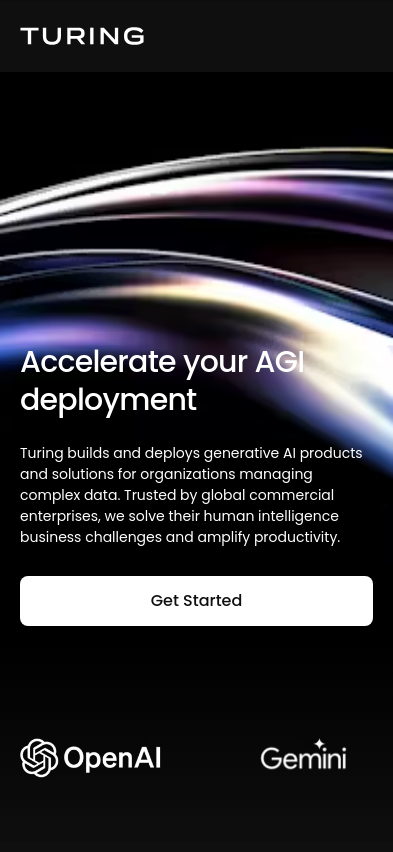
Turing hires the best remote software developers, pre-vetted for a Silicon Valley bar. It helps ambitious companies and talented engineers find each other using AI.
The company offers a range of advanced AI services and solutions, focusing on the development and deployment of Artificial General Intelligence (AGI) and large language models (LLMs). Here is a breakdown of their offerings and services:
AI and LLM Focus Areas:
- AGI Training & LLM Evaluation: The company provides comprehensive assessments of model performance, accuracy, and scalability.
- LLM Training: Focused on enhancing reasoning, coding, and knowledge improvements using proprietary human data.
- Multimodality: Integrating text, images, and videos for creating human-like intelligence models.
- LLM Factuality: Ensures models' outputs are factually accurate, reducing misinformation and improving source credibility assessment.
Alignment and Safety:
- LLM Alignment & Safety: Strategies for bias mitigation, integration of Reinforcement Learning from Human Feedback (RLHF), and adherence to safety protocols are prioritized.
Application Engineering:
- Generative AI: Customizable generative AI solutions are engineered to meet enterprise needs.
- AI/Data Solutions: Accelerates AI adoption and optimizes machine learning operations.
- Custom Engineering: Includes application development, cloud migration, and crafting innovative solutions tailored to client needs.
Multimodal Integrations:
They offer services for integrating various data types—text, images, audio, video—for more sophisticated contextual understanding and content generation.
Model Enhancement Tools:
The focus is on improving LLM models by customizing Python functions for multistep tasks and integrating diverse tools for better task execution.
Resource Utilization:
The company provides resources such as:
- LLM Fine-Tuning Guides: Methods and best practices for optimizing models.
- Secure Application Development: Guidelines on building secure LLM applications to improve development productivity.
Talent Acquisition and Management:
For the workforce, they offer:
- Job Matching: Strategies for matching professionals with suitable job opportunities.
- Developer Resources: Tools and tips to enhance technological skills and stand out in the job market.
Experience and Partnerships:
- They have expanded their talent pool to over 3 million professionals.
- The company is an official partner with major AI companies, providing trusted data and training solutions to address AGI adoption challenges.
Company Overview:
- Established in 2018, it’s headquartered in Palo Alto, California, and operates fully remotely.
- The leadership includes co-founders Jonathan Siddharth and Vijay Krishnan, and a team of executives overseeing various facets of AI and LLM services.
Engagement and Offerings:
Potential engagements with the company include:
- Explore careers and find remote, well-paid jobs in the AI sector.
- Businesses can leverage AI solutions tailored to their specific needs, including AI-powered talent and project implementation.
Recognition:
The company has received multiple accolades for its innovation and contribution to the AI and business landscapes, reflecting its strong position within the industry.
Overall, the focus of Turing's services lies in leveraging AI and machine learning to deploy efficient and effective generative AI solutions, address various business needs, and support talent development in the tech industry.
Figure AI
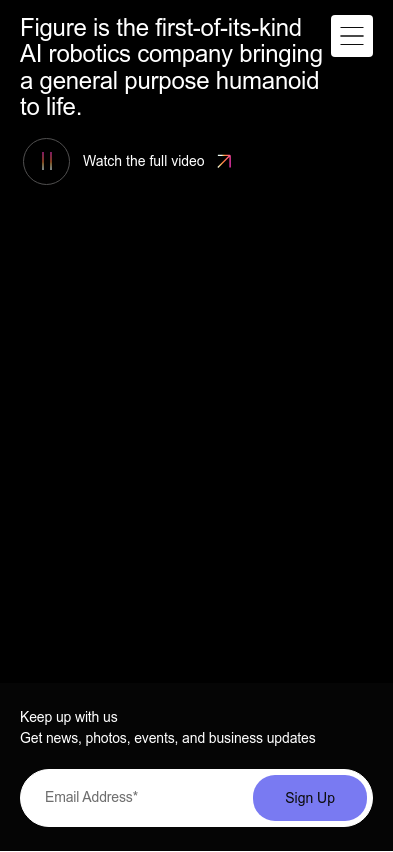
Figure AI creates AI-driven humanoid robots for automation in manufacturing and logistics, focusing on labor-intensive tasks. They recently raised $675 million for further development.
Figure is an AI robotics company focused on integrating artificial intelligence with humanoid robotics to address notable labor shortages. Here's a breakdown of their core offerings and mission:
Key Offerings and Innovations:
-
Figure 02 Humanoid Robot: Figure's primary product is the Figure 02, described as the first commercially viable autonomous humanoid robot designed to operate across various sectors like manufacturing, logistics, warehousing, and retail. These robots are designed to mimic human dexterity with dimensions resembling a human body (5'6" height), making them adept at tasks like handling tools, moving cargo, and navigating environments built for humans.
-
AI Integration: Figure emphasizes creating robots that learn and improve over time, mirroring human learning behaviors. They have developed a data engine that facilitates continuous learning and reasoning across a fleet of humanoids. Their collaboration with leading AI partners, like OpenAI, allows for advanced functionalities such as speech-to-speech reasoning.
-
Master Plan & Progress: The ambition is to fill the widening gap in the labor market, particularly in essential roles across various industries. They're progressing through phases, aiming to refine multimodal models, enhance training on humanoid data, and broaden application with generalized AI.
Strategic Vision and Impact:
-
Mission and Culture: Figure is committed to expanding human capabilities through AI-driven solutions. Their mission focuses on using advanced technologies to create a positive impact, offering safer working conditions and opportunities for more fulfilling work by replacing unsafe and undesirable jobs with robots.
-
Long-term Goals: The vision extends to deploying humanoids globally, addressing immediate labor shortages, and eventually expanding into areas like elder care, household assistance, and extraterrestrial construction. The company is preparing for a potentially transformative impact on future labor markets, aiming for robots that could make manual labor optional, reducing costs, and increasing the availability of services.
-
Commitment to Culture: They maintain a strong, defined set of values focusing on rapid innovation, aligning with a mission-first mindset, and fostering an environment that prioritizes progress and safety. They seek dedicated individuals who share their vision for long-term impact.
Operational Philosophy and Values:
-
Values: Their values emphasize technical fearlessness, prioritizing product development over distractions, optimism in overcoming significant challenges, and maximizing future impact. They uphold a "championship mindset," encouraging collaboration and high-performance teamwork.
-
Team and Growth: With a robust team of professionals combining AI and humanoid experience, Figure is positioning itself for future growth. They're actively seeking new talent in AI, engineering, and design to continue pushing advancements in humanoid robotics.
Legal and Policy Commitments:
-
Privacy and Terms Compliance: Figure is committed to privacy and terms compliance, outlining a detailed Privacy Policy that governs data collection, usage, and sharing practices. They emphasize user rights, including California-specific privacy rights under CCPA.
-
Accessibility: The company advocates for broad accessibility, ensuring their website meets WCAG 2.1 standards to aid all users.
In summation, Figure is carving a niche at the intersection of AI and robotics, aiming to address labor challenges through humanoids while fostering a culture of rapid innovation and ethical development. Their long-term vision encompasses significant impacts extending into various facets of daily life and industry, aiming to redefine labor standards and quality of life.
CHEF ROBOTICS

Automates industrial food manufacturing to reduce labor and food costs.
Chef Robotics specializes in AI-based robotic solutions for food preparation, addressing critical labor shortages in the food industry. This company, based in San Francisco, aims to provide solutions that empower food companies to increase production while maintaining flexibility and cost-effectiveness. Here's an overview of their approach and offerings:
Overview:
-
AI and Robotics: Chef Robotics uses AI to enhance existing hardware, enabling robots to perform tasks traditionally conducted by human workers. They emphasize the flexibility of their systems to handle the variability in food types and preparation styles.
-
ChefOS: The core of their solution, ChefOS, uses modern AI techniques to improve food manipulation capabilities. The system learns from data to increase efficiency and accuracy, adapting to new conditions and environments.
-
Robotics as a Service (RaaS): The company offers a subscription model that allows businesses to use their robotic systems without substantial upfront capital expenditures. This model includes full support, maintenance, and real-time monitoring, with ongoing updates to both hardware and software.
Customer Impact:
-
Labor Shortage Solution: Chef Robotics responds to severe labor shortages in food prep by providing an alternative to manual labor. Their robots can perform repetitive tasks with the precision and reliability needed in high-mix environments.
-
Customer Success: The company highlights success stories from clients like Amy’s Kitchen, Chef Bombay, and Sunbasket. These case studies show improvements in consistency, reduction in food waste, and increased labor productivity.
Mission and Vision:
-
Long-Term Goals: Chef Robotics aims to set up AI-enabled robots in every commercial kitchen. They believe in creating an environment where AI can free humans from monotonous tasks, focusing on roles that require creativity and strategic thinking.
-
Food Industry Focus: This sector was chosen due to its critical labor issues. By augmenting food production capabilities with robotics, Chef Robotics envisions lowering food costs and increasing availability.
Operational Model:
-
Flexibility and Adaptability: The AI-enabled robots are designed to be as adaptable as human workers. They can work with various food types, portion sizes, and trays, which suits changing production requirements.
-
Data-Driven Improvements: The company uses a data-driven approach, collecting information from each deployment to refine and enhance their AI models continually.
Industries Served:
- Chef Robotics serves multiple sectors, including frozen and fresh prepared meals, contract manufacturing, meat packing, patient trays, airline catering, and ghost kitchens.
Innovative Approach:
-
AI Embodiment: The company emphasizes that AI’s greatest potential impact lies in physical applications, highlighting their AI's capacity to learn continuously and adapt to physical tasks.
-
Customer Collaboration: Chef Robotics positions itself as a partner in transformation, assisting clients in navigating the shift to automated processes.
Chef Robotics aims to revolutionize the food production industry by providing AI-enabled robotic solutions that address labor shortages while improving productivity and reducing costs. Their flexible, scalable, and data-driven approach offers a robust solution tailored to the unique needs of various food sector clients.
Apera AI

Apera AI specializes in developing 4D vision technology for industrial robotics to improve the reliability and productivity of vision-guided robotics. Their technology includes products like Apera Vue robotic vision software and Forge Lab AI simulation.
Apera AI is an organization focused on enhancing factory productivity by providing robots with advanced vision capabilities akin to human vision. Their core offerings include AI-driven robotic vision software, particularly through products like Vue software, 4D Vision technology, and Forge Lab AI training & simulation environments, each designed to improve the reliability and productivity of vision-guided robotics in various industrial applications.
Main Technologies and Products:
-
Apera Vue Software: A robust AI-driven robotic vision system empowering robots with advanced object recognition and path planning capabilities. The Vue software is noted for its ability to operate in diverse lighting conditions and its compatibility with major robot brands, providing enhanced performance in tasks such as bin picking, assembly, and machine tending.
-
4D Vision Technology: Uses AI to create a 3D understanding from 2D camera inputs, enabling robots to interact with their environment with a high level of precision and reliability. It is designed to function in all lighting conditions without the need for special equipment.
-
Forge Lab: A web-based AI training and simulation platform facilitating the setup and testing of vision-guided robotic cells. This platform aims to minimize risk and time in developing complex robotic systems without the need for hardware, showcasing Apera AI's commitment to making automation accessible and efficient.
Applications and Industries:
Apera AI's technologies are applicable across various industries including automotive, medical devices, life sciences, and metal fabrication. Key applications of their vision-guided robotics include:
-
Bin Picking: A complex task made efficient with AI-powered vision, allowing for fast and accurate sorting and handling of diverse objects, including clear and shiny items.
-
Robotic Assembly and Guidance: Automates complex assembly processes and provides precise guidance for robotic operations, improving productivity and reducing manual intervention.
-
Machine Tending: Automates the feeding and removal of parts in CNC or laser marking machines, optimizing labor usage and ensuring consistent productivity.
-
Sorting and Packaging: Assists in sorting delicate and similar-looking objects with accuracy, enhancing speed and precision in packaging operations.
Strategic Partnerships and Ecosystem:
Apera AI collaborates with a network of robotics partners, integrators, and distributors, broadening its reach and ensuring robust support for implementation. The compatibility of Vue software with various robot brands, such as ABB, FANUC, and Universal Robots, supports diverse applications across different industries.
Company Philosophy and Culture:
-
Innovation and Expertise: Apera AI is led by a team with deep expertise in AI, machine learning, and robotics, dedicated to driving improvements in manufacturing.
-
Technological Impact and Investment in People: Encourages a culture of scientific inquiry and real-world problem-solving, valuing diverse perspectives and continuous learning.
Customer Engagement and Success Stories:
Notable projects, such as those with Linamar Corporation and Flex-N-Gate, illustrate Apera AI's effective integration of robotic vision solutions leading to significant enhancements in production efficiency and quality standards.
Growth and Career Opportunities:
Apera AI is rapidly expanding in the AI and automation sector and invites individuals passionate about cutting-edge technology and problem-solving to join their team, offering roles that contribute directly to pioneering industrial automation solutions.
Overall, Apera AI is positioning itself as a significant facilitator of advanced robotics in manufacturing, with a distinct focus on leveraging AI for revolutionary improvements in reliability, flexibility, and productivity across global industries.
Mujin
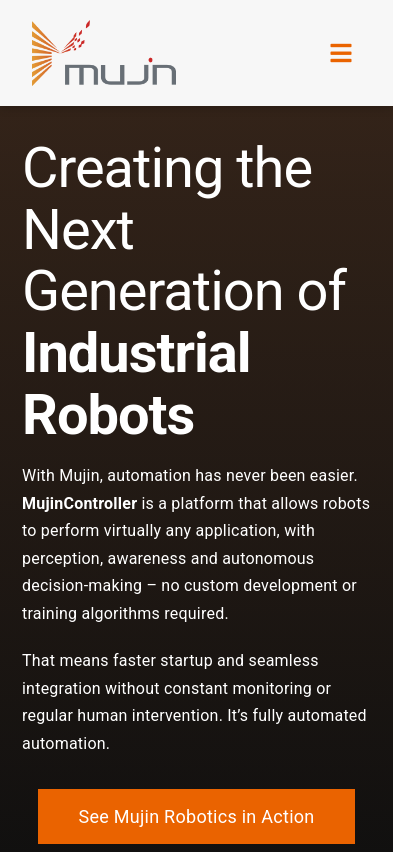
Mujin develops automation solutions for industrial robots to simplify factory and logistics automation and increase worldwide productivity.
Mujin Corporation is focused on simplifying automation in industrial robotics, offering a range of applications and products designed to enhance efficiency and ease of deployment across various warehouse and logistic operations. Below are the key aspects of their offerings:
Key Technologies and Products
-
MujinController: This is a versatile platform enabling robots to autonomously perform a wide range of applications. It leverages machine intelligence for perception, awareness, and decision-making, which allows for quick setup and operation without extensive programming or monitoring.
-
MujinMI (Machine Intelligence): A core technology in Mujin's products, MI facilitates real-time decision-making and is designed to operate efficiently with minimal errors, enabling fast and reliable task completion.
-
QuickBot: A solution for risk-free warehouse automation that deploys within hours and doesn't require upfront costs. QuickBot is capable of palletizing, depalletizing, and repalletizing, handling mixed SKU scenarios with advanced AI vision.
-
TruckBot: This product automates the unloading of containers and trailers, which can significantly improve the safety and efficiency of warehousing operations. TruckBot operates autonomously and integrates with existing dock systems.
Applications
Mujin offers several applications aimed at optimizing warehouse operations:
-
Palletizing & Depalletizing: Offers robots that can adapt dynamically to various packaging scenarios, automating the management of mixed SKU pallet loads.
-
Piece and Bin Picking: Automates the labor-intensive process of order fulfillment by enabling precise and adaptive handling of diverse product types with built-in vision algorithms for real-time operation.
-
Robotic Case Picking: Designed to optimize logistics and order fulfillment operations, it enhances the speed and accuracy of organizing and dispatching goods rapidly.
Industry Contributions
Mujin has expanded its reach globally, with operations in Japan, the United States, China, and Europe. Notable achievements include various awards for innovation in robotic technologies and the expansion of their footprint to address labor shortages and enhance automation in warehouses worldwide. Mujin is recognized for its user-friendly 'teachless' approach, which makes robotics accessible and usable without extensive technical expertise.
Market Implications
The need for warehouse automation is growing rapidly, and Mujin aims to address this by providing platforms that enable smarter, more efficient workflow management. The company's technologies are adaptable across different industries, including retail, logistics, food and beverage, and consumer packaged goods, each benefiting from enhanced operational strategies like forward fulfillment and efficient material handling.
Career Opportunities
Mujin highlights growth in the robotics field, seeking innovative individuals for a variety of roles. The company values creativity and boundary-pushing ideas, as it aims to contribute to workplace productivity enhancements through robotics technology.
Future Goals
Mujin's future vision includes expanding the application of intelligent robotics to diverse fields and enhancing the integration of automation into various industries, further supporting the establishment of human-friendly work environments and boosting productivity.
By leveraging advanced robotics and automation technologies, Mujin seeks to overcome the challenges of manual labor shortages, drive efficiency in logistics, and maintain competitiveness in a fast-paced market.
EverestLabs

EverestLabs provides an AI-driven recycling platform aimed at increasing revenue, lowering labor costs, and boosting recycled content. Their solutions include data and robotics platforms that optimize recycling operations.
EverestLabs Summary for Executive Review
1) Company's Key Focus Area: EverestLabs specializes in recycling technology, particularly in creating AI-driven solutions to optimize operations at Materials Recovery Facilities (MRFs). Their principal focus is on enhancing recycling processes to prevent materials from reaching landfills and supporting a sustainable circular economy by identifying and sorting recyclable materials with their RecycleOS platform.
2) Unique Value Proposition and Strategic Advantage: EverestLabs sets itself apart with its proprietary AI-powered operating system, RecycleOS. This system offers several key advantages:
- Automation and Precision: Utilizes advanced vision technology and robotics for precise material identification and sorting, reducing error rates in recycling processes.
- Integration and Flexibility: Easy to install on existing recycling conveyor systems without downtime, meaning no costly retrofits are necessary. The system adapts quickly to new materials.
- Data-Driven Insights: Provides rich data analytics that allow clients to optimize operational efficiencies continuously.
3) Delivery on Value Proposition: The company delivers on its promises through several strategies:
- Robotic Solutions: Their RecycleOS includes robotic arms that outperform manual efforts by significantly improving sorting precision and speed, helping clients to enhance material recovery rates and purity standards.
- Comprehensive Monitoring and Support: Continuous, 24/7 monitoring via a Robotics Operations Center which ensures high uptime and quick response to any issues.
- Adaptability: The AI system is continuously updated to recognize new material types, allowing rapid adjustments to recycling processes.
- Case Studies and Performance Metrics: Demonstrated successes include a 59% reduction in labor costs at Alameda County Industries and significant improvements in material recovery at Caglia Environmental, validating economic and operational improvements.
EverestLabs promises financial efficiency, such as labor cost reductions and increased revenue from previously mis-sorted recyclables. The platform is designed for rapid payback, suggesting customers often recover their investment in a few months, boosting return on investment considerably.
By addressing critical pain points in recycling facilities that struggle with staffing challenges, cost inefficiencies, and regulatory requirements, EverestLabs positions itself as a key player in the recycling technology age. Through its combination of AI, robotics, and data analytics, it aims to modernize sorting processes while contributing to global sustainability efforts.
Cleanlab
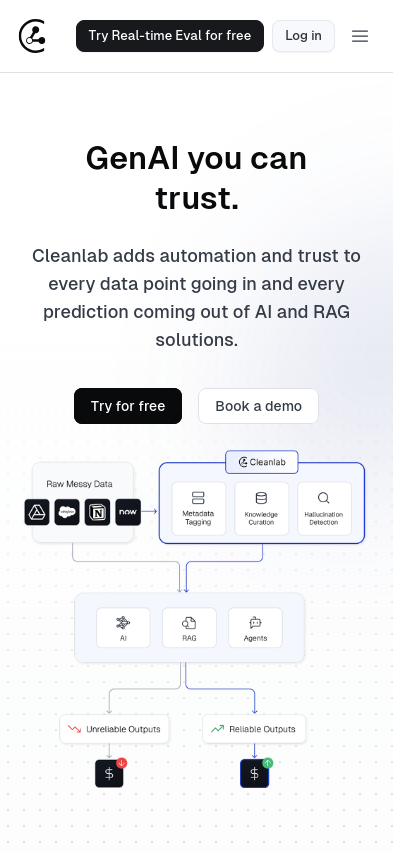
Cleanlab’s AI algorithms find and fix errors in datasets, with the goal of turning unreliable data into reliable models and insights. Cleanlab’s AI algorithms find and fix errors in datasets, turning unreliable data into reliable models and insights. CleanLab is involved in the evaluation, observability, and experiment tracking aspects of machine learning. Cleanlab’s AI algorithms find and fix errors in datasets, with the goal of turning unreliable data into reliable models and insights.
Cleanlab.ai Company Summary:
1) Key Focus Area: Cleanlab focuses on enhancing data quality and reliability for artificial intelligence (AI) and general AI (GenAI) applications. The company's core specialization lies in automating data curation processes to improve data quality for AI models, business intelligence, and analytics tasks. Their platform aims to address errors within data sets, which can negatively impact revenue and hinder the performance of machine learning (ML) and AI solutions.
2) Unique Value Proposition and Strategic Advantage: Cleanlab's unique value proposition is its offering of an AI-powered data curation platform that automates and improves data science and engineering tasks. This platform is characterized by:
- Automated detection and correction of data errors, including label errors, outliers, personal identifiable information (PII), and poor-quality images.
- Addition of intelligent metadata for increased data reliability without needing human input.
- Trustworthy Language Model (TLM) that provides hallucination detection, observability, and trustworthiness scores for AI outputs.
Strategically, Cleanlab leverages automation and artificial intelligence to distinguish its offering from third-party data annotation tools and aims to enable rapid, scalable improvements without requiring code. This speeds up productivity, curtails costs, and enhances data quality assurance significantly.
3) Delivery on Their Value Proposition: Cleanlab executes its value proposition through various functionalities designed around automation in data management:
- Data Curation: Cleanlab Studio automatically refines data by addressing errors and automates metadata addition, making the data more reliable for model training and analytics.
- Trustworthy AI Systems: The system detects hallucinations in GenAI systems, ensuring high-quality outputs using Cleanlab’s Trustworthy Language Model for improved response quality.
- Automated Labeling: The platform offers domain-specific automated labeling, enhancing the labeling process's accuracy and efficiency over traditional methods.
- Analytics and Model Deployment: Users can explore data set summaries, identify classes with labeling issues, and deploy robust models using an advanced AutoML. This includes tasks like data preprocessing, model tuning, and deployment— all aimed at improving data and model performance with minimal user intervention.
Overall, Cleanlab positions itself as a platform providing comprehensive data quality management solutions, designed to integrate automation into each step of the data handling process. This approach not only improves data quality and predictability in AI outputs but also enhances operational efficiency and cost-effectiveness for its clients.
MontBlancAI
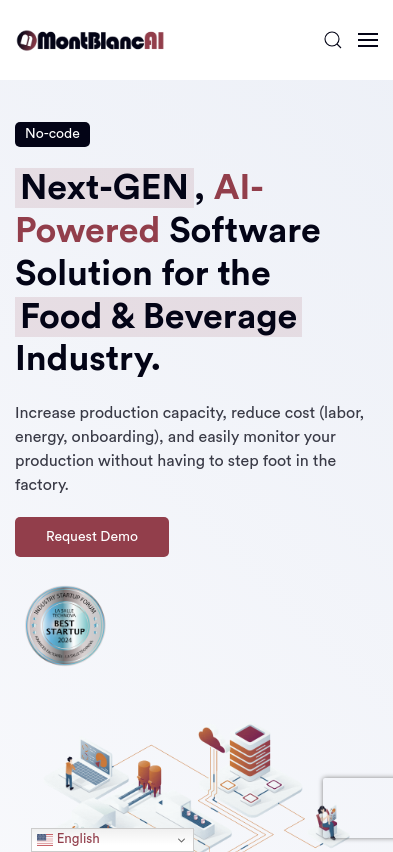
MontBlancAI provides anomaly-detection algorithms to help manufacturers monitor production levels, machine condition, and implement predictive maintenance.
MontBlancAI Overview
1) Key Focus Area: MontBlancAI is primarily focused on providing AI-powered software solutions specifically designed for the food and beverage industry's manufacturing sector. The platform's main objectives are to optimize production capacity, reduce costs related to labor and energy, and enhance production monitoring.
2) Unique Value Proposition and Strategic Advantage:
- Mission: The company offers a comprehensive software solution that emphasizes no-code deployment, ensuring easy integration and scalability across different factory environments without extensive onboarding or changing existing processes.
- Competitive Edge: MontBlancAI distinguishes itself with its AI-driven algorithms focused on anomaly detection, predictive maintenance, and process validation that allow for real-time insights into production processes. The company highlights its unique ability to overlay production batches and visualize data for quick analysis and anomaly investigation.
- Additional Capabilities: It leverages its AI capabilities for condition monitoring and predictive maintenance to predict machine failures, optimize machine utilization, and improve operational efficiency. It positions itself as an industry-agnostic tool, mainly serving the food and beverage sector but applicable to a wide range of manufacturing industries.
3) Delivery on Value Proposition:
- Product Features: MontBlancAI’s software suite includes several critical functionalities such as real-time monitoring, batch traceability, machine utilization analytics, and customizable reporting that focuses on strategic planning priorities.
- Integration Tools: The SnapEdge device simplifies the connection of factory machinery to MontBlancAI's cloud-based platform, facilitating data collection and process monitoring within minutes. This plug-and-play approach reduces setup complexities associated with such advanced systems.
- Customer Engagement: The firm offers free trial periods for potential clients, which allows them to test the comprehensive features without immediate commitment. Reports of customer success stories, such as increased production capacity without additional equipment purchases or enhanced continuous improvement through data centralization, illustrate the practical benefits clients may experience.
- Support and Adoption: The tool is presented as user-friendly with minimal training required, ensuring broad adoption across all levels of manufacturing personnel. This user-centric approach is bolstered by features like automated alerts for swift issue resolution, collaborative capabilities across departments, and secure data handling in line with industry standards.
Lex Machina
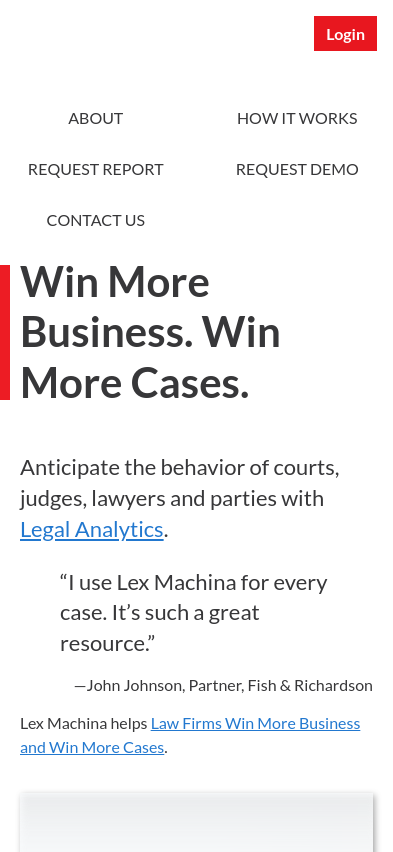
Lex Machina offers data-driven insights enabling law firms to pitch, land new clients, and win lawsuits.
Overview of Lex Machina
1. Key Focus Area: Lex Machina, a division of LexisNexis, specializes in providing Legal Analytics® to legal professionals including law firms, companies, courts, and judges. Its core function is to enable the use of data-driven insights for crafting successful litigation strategies, thereby facilitating the winning of cases and attracting more business.
2. Unique Value Proposition and Strategic Advantage:
- Comprehensive Data Collection: The platform stands out by compiling legal data directly from court dockets, which is then vetted and enhanced using artificial intelligence coupled with expert human oversight. This ensures the provision of accurate and up-to-date legal data.
- Outcome and Insight Generation: Lex Machina’s value lies in its ability to offer unique outcome analytics, highlighting resolutions, timings, damages, findings, and more, which are vital for understanding case dynamics.
- Customizable Analytics: Users benefit from practice-specific filters and tags that help in quickly finding and comparing similar cases, thereby facilitating the creation of comprehensive case lists.
- Accuracy and Transparency: The platform is distinguished by its accuracy through the use of its Attorney Data Engine, which corrects and supplements missing information, providing a clearer picture of counsel involved in cases.
3. Delivery on Value Proposition:
- Advanced AI and Human Expertise Integration: By integrating cutting-edge artificial intelligence with attorney-reviewed processes, Lex Machina ensures precision and comprehensiveness. This means legal professionals can uncover critical insights on judges, courts, law firms, and opposing parties rapidly.
- Immediate Access and Customization: With on-demand subscription access, the platform supports the customization of analytics, allowing users to apply filters pertinent to their particular areas of interest or cases.
- Instant and Intuitive Analysis Tools: Quick Tools within the platform provide fast comparison capabilities for different entities involved in litigation, such as courts, judges, and attorneys, enhancing the speed and efficiency of the analysis.
- Detailed Reports: Lex Machina offers expansive reports covering various practice areas. These reports, created by a team of attorneys, engineers, and data specialists, demonstrate current litigation trends, assisting legal practitioners in making informed decisions.
- API Integration: The Lex Machina API provides direct access to the underlying data, facilitating integration into user workflows, thus enabling firms to seamlessly leverage analytics in their unique applications.
Conclusion: By offering an analytical edge through detailed legal insights and comprehensive data, Lex Machina positions itself primarily as a tool for boosting litigation success rates and enhancing competitive strategy. Its emphasis on precise data and customization capabilities makes it a salient resource for legal professionals aiming to optimize their litigation strategies and reduce associated risks.
Lablab.ai
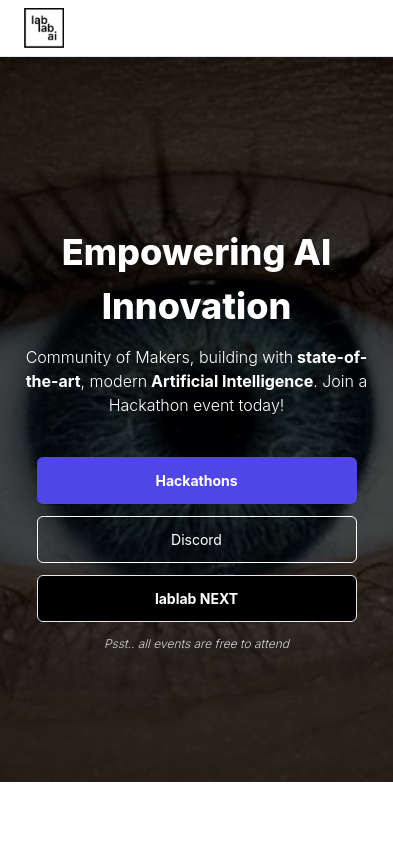
Lablab.ai hosts hackathons and provides resources for AI and technology development, including partnerships with established organizations in the space and tech sectors.
About | About | About | About | About | About | About | About | About | About | About | About | About | About | About | About | About | About | About
- Key Focus Area of Lablab.ai:
Lablab.ai is centered around fostering innovation in artificial intelligence through community-driven events, particularly hackathons. These hackathons serve as a platform for AI professionals, tech enthusiasts, and domain experts from various fields to collaborate, create, and innovate with advanced AI technologies. The company aims to build a robust community of makers and innovators who are keen on developing the AI-native future.
- Unique Value Proposition and Strategic Advantage:
Lablab.ai uniquely positions itself as a facilitator of innovation by organizing AI hackathons that are both accessible and globally inclusive. Their strategic advantage lies in their ability to engage a diverse group of AI practitioners, innovators, and hackers to collaboratively solve undefined challenges. By not prescribing specific problems, they encourage creative solutions across sectors such as healthcare, public administration, and education. The company hosts frequent events where participants can utilize state-of-the-art AI technologies, engage in competitive yet cooperative environments, and receive mentorship from industry experts.
- How They Deliver on Their Value Proposition:
-
Hosting Hackathons: Lablab.ai conducts numerous hackathons that invite global participation. These events are structured to be inclusive, allowing both in-person and online participation, thus connecting a worldwide audience of AI enthusiasts.
-
Mentorship and Guidance: Throughout the events, participants receive guidance from seasoned mentors who provide domain expertise, insights, and address project-related queries. This mentorship is crucial in helping teams navigate technical challenges and refine their projects.
-
Use of Cutting-Edge Technologies: Participants have access to advanced AI platforms and models such as IBM Watson, Google's Gemma, Grok by xAI, and more. These tools facilitate the creation of sophisticated AI solutions across various domains.
-
Community and Network Building: Lablab.ai leverages its platform to build a community of innovators. By participating in their events, individuals can network with like-minded peers, forming teams that build solutions collaboratively.
-
Post-Hackathon Opportunities: Winners often receive invitations to further acceleration programs like Lablab NEXT, providing continued support to scale their prototype projects. Additionally, successful projects might gain further recognition and support, fostering an environment of sustained innovation beyond the hackathon itself.
By focusing on these aspects, Lablab.ai not only promotes AI innovation but also enhances individual skill development, professional networking, and the practical application of AI technologies to solve real-world problems.
Liquid AI
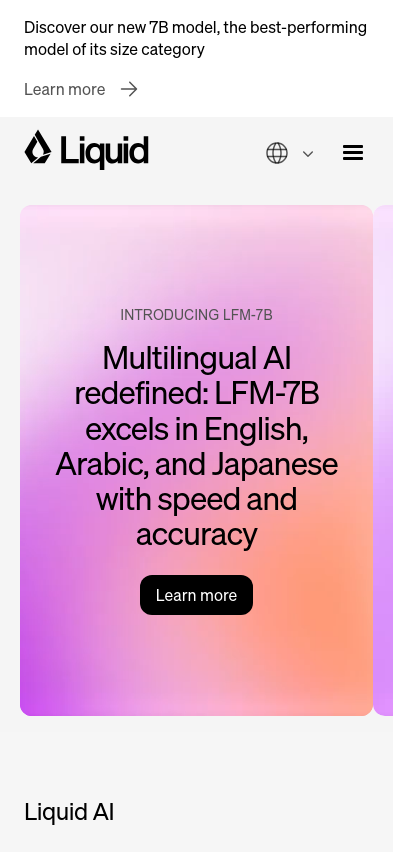
Liquid AI focuses on developing advanced, general-purpose AI systems that align with human values and trustworthiness.
Liquid AI, an MIT spin-off based in Boston, primarily focuses on developing general-purpose AI systems that are capable, efficient, and scalable. Their efforts are centered around creating AI foundation models that leverage innovative architectures and theoretical foundations in machine learning, signal processing, and numerical linear algebra.
Key Focus Area: Liquid AI's main focus is the development of general-purpose AI systems through its Liquid Foundation Models (LFMs). These models are structured to handle various forms of sequential data across numerous industries, including financial services, biotechnology, and consumer electronics. Their LFMs, notably the LFM-7B, are designed to provide comprehensive AI functionalities that are both energy and memory efficient.
Unique Value Proposition and Strategic Advantage:
- Innovation in AI Architecture: Liquid AI emphasizes a shift from traditional transformer-based models, such as GPTs, to their own non-transformer-based architectures. This pivot reportedly allows their models to be highly efficient, offering superior performance with reduced computational demands.
- Multilingual and Multi-modal Capabilities: Liquid AI asserts that its LFMs excel in multiple languages, including English, Arabic, and Japanese, and are adaptable to various industry-specific applications.
- Low Memory Footprint: The architecture of LFMs ensures a minimal memory footprint, which is posited to lead to cost-efficiency in deployment and tuning processes.
- Strategic Collaborations and Funding: Liquid AI has garnered a significant $250M Series A funding primarily led by AMD Ventures, alongside collaborations with influential entities like Capgemini and ITOCHU, to scale their products and penetrate various markets effectively.
How They Deliver on Their Value Proposition:
- Model Deployment and Customization: Liquid AI offers models that can be finely tuned and deployed directly on-premises or on edge devices. Through their Liquid Engine, they provide high-performance AI solutions that are claimed to adapt to enterprise-specific needs with reduced latency and enhanced privacy.
- Comprehensive Model Stacks: The LFMs come with integrated inference and customization stacks that allow enterprises to adapt the technology for private, secure, and specific use cases.
- AI Integrated Platforms: Their products are available for trial and integration through several accessible platforms, such as Amazon Bedrock and the Liquid Playground, aiming to make LFMs versatile and easy to access for development teams.
- Rapport with Strategic Partners: They actively work on creating AI solutions in collaboration with partners, like their joint projects with Capgemini to develop new capabilities in AI domains such as edge solutions and enterprise AI transformations.
Liquid AI seems to position itself as a forerunner in the transition to advanced, efficient AI models tailored for broad applications, purporting to reduce carbon footprints associated with traditional AI infrastructure and facilitate easier deployment and customization for enterprises. Nonetheless, it's important to recognize these claims as part of a marketing narrative.
Abacus.AI
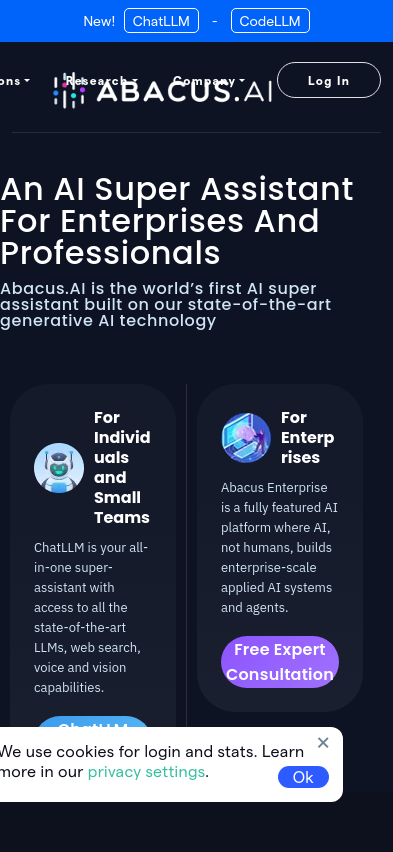
Abacus.AI enables businesses to implement AI without needing expert developers by offering pre-trained models for tasks like customer service and forecasting. Abacus.AI offers pre-trained models for business tasks like customer service, simplifying AI implementation without expert developers.
News | About | About | About | About | About | About | About | About | About | About | About | About | About | Vision/Values | About | Vision/Values | About | About | About | About | About | About | About | About | About | About | About | About | About | About | About | About | About | About | About | About
-
Company's Key Focus Area: Abacus.AI is primarily focused on providing AI-driven solutions tailored for both individual professionals and large enterprises. Their main goal is to automate and enhance business processes through the use of AI technology. This includes a broad range of applications, such as predictive modeling, personalization, anomaly detection, and AI-based decision-making tools. They offer platforms and tools to build AI agents and chatbots, optimize resources through discrete optimization, and utilize vision AI for modeling tasks.
-
Unique Value Proposition and Strategic Advantage: Abacus.AI positions itself as an AI super-assistant that leverages generative AI technology to automate various business processes. Their strategic edge lies in their state-of-the-art AI capabilities, including structured machine learning, vision AI, and personalized solutions, along with a commitment to open-source generative AI models. They claim that their AI systems can enhance productivity and efficiency by automating complex tasks and reducing human intervention.
-
Delivery on Their Value Proposition: To deliver on its value proposition, Abacus.AI employs:
-
AI Super Assistants: Tools like ChatLLM and CodeLLM are designed to integrate AI capabilities across platforms, providing services like web search, image generation, and code editing.
-
Comprehensive AI Platform: For larger organizations, they offer a platform capable of building enterprise-scale AI systems, using AI to create and manage other AI agents and processes. This platform aims to automate tasks such as fraud detection, contract analysis, and personalized marketing.
-
Structured ML and Predictive Modeling: Abacus.AI provides tools to create machine learning models tailored to specific data inputs, ensuring accurate business predictions and process optimizations.
-
Vision AI and Optimization: These services offer advanced solutions for image analysis and optimizing business processes under given constraints, aimed at reducing costs and increasing efficiency.
-
Integration and Customization: The company offers integration with existing data systems, allowing for customization and personalized setups that fit specific business needs and enable contextual AI interactions.
-
Consultation and Support: They provide consultations to help enterprises tailor the AI solutions to their specific requirements and offer support throughout the implementation process.
-
Overall, their approach focuses on using cutting-edge AI models and deep learning techniques to build custom solutions that improve business process efficiency and decision-making.